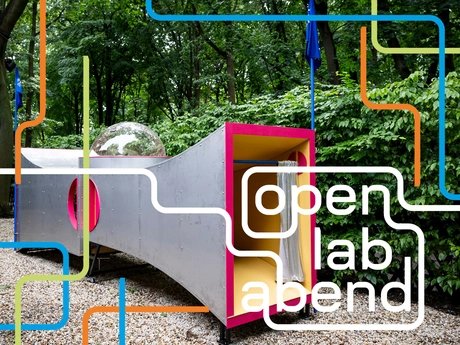
How can complex scientific findings be communicated in an understandable, engaging, and inspiring way? This Open Lab evening is about making science tangible and exploring new formats for different target groups. The Open Lab evening is aimed at everyone interested in science communication, education, and schools.
The "Utopia Mobile – Time Machine and Idea Generator" – and the "Utopia Cookies" playfully encourage reflection on the future of science communication.
The discussion will be documented live by an illustrator. At the end, we will consider together what a science project day at schools could look like to introduce students to scientific thinking and work.
Workshop leader:
-> Johanna Gereke, PhD, Federal Institute for Population Research and Mannheim Center for European Social Research, University of Mannheim
Johanna Gereke is an empirical social scientist and currently a research associate at the Federal Institute for Population Research (BiB) and a project manager at the Mannheim Center for European Social Research (MZES) at the University of Mannheim. She has been a member of the Junge Akademie (Young Academy) since 2021, where she is particularly involved in projects on science communication and internationalization. Among other things, she addresses the question: How can topics such as migration, integration, and diversity be communicated comprehensibly and how can facts be separated from value judgments?
In cooperation with the Junge Akademie, which offers outstanding young scientists and artists interdisciplinary creative space, further input on various topics will be provided by:
-> Lisa Buchauer, member of the Junge Akademie and Professor of Systems Biology of Infectious Diseases at the Charité-Universitätsmedizin Berlin. "How can findings about the immune system be explained clearly?"
-> Leonie Wenz, member of the Young Academy and head of the Social Change and Well-being Lab, deputy head of the Complexity Research Department at the Potsdam Institute for Climate Impact Research, and professor of environmental economics at TU Berlin. "How can complex data on the consequences of climate change be communicated?"
-> Fabian Hruschka (journalist): "What are the pitfalls in science communication – and what might science communication look like in the future from a journalistic perspective?"
Information
-> Venue: Workshop Futurium Lab (-1)
-> Admission: free
-> Event language: German
-> Maximum number of participants: 40 people
-> Conditions of participation: no prior knowledge required
-> Recommended age: 16 years and older
Photo & Video
Photos and videos will be taken during the event. If you do not wish to be photographed, please contact us in advance.
Tickets
You require a ticket for this event.
Due to limited space, only one ticket per person can be booked.
(IN GERMAN)
Additional information
Accessibility
Accessibility
-> Wheelchair-accessible venue.
-> Seats without seating are available for wheelchair users.
The future is for everyone! Futurium strives to be accessible to everyone. If you have any other access needs, please let us know. Email: info@futurium.de
-> Wheelchair-accessible venue.
-> Seats without seating are available for wheelchair users.
The future is for everyone! Futurium strives to be accessible to everyone. If you have any other access needs, please let us know. Email: info@futurium.de
Dates
November 2025
| Mo | Tu | We | Th | Fr | Sa | Su |
|---|---|---|---|---|---|---|
1
|
2
| |||||
3
|
4
|
5
|
6
|
7
|
8
|
9
|
10
|
11
|
12
|
13
|
14
|
15
|
16
|
17
|
18
|
19
|
20
|
21
|
22
|
23
|
24
|
25
|
26
|
27
|
28
|
29
|
30
|



